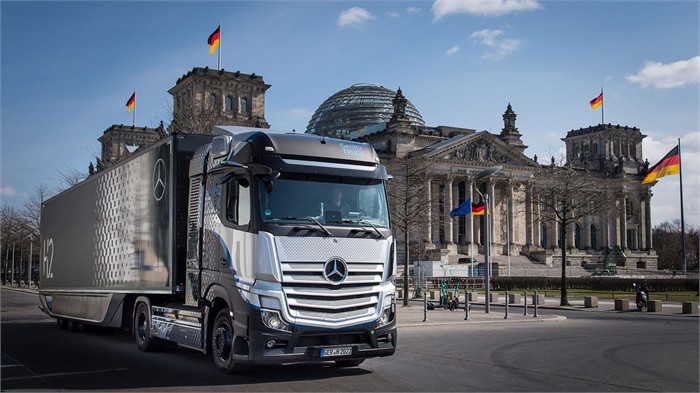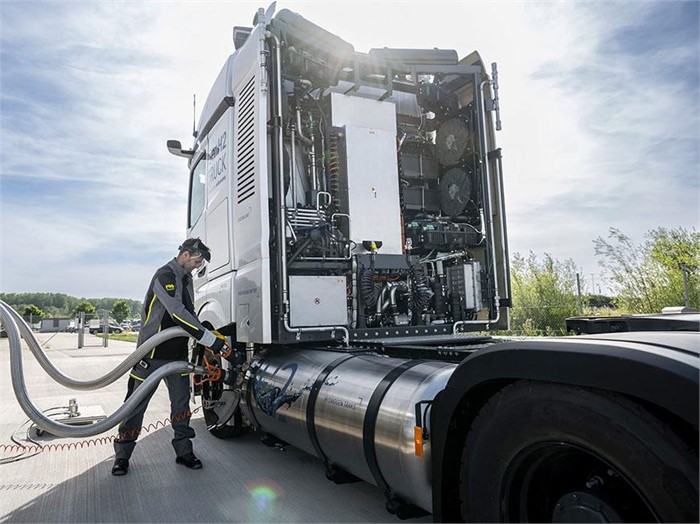Mercedes-Benz Testing Fuel Cell-Powered GenH2 Truck
Daimler Truck brand Mercedes-Benz Trucks has laid out its plans for hydrogen-powered heavy-duty hauling at the IAA Transportation conference (formerly IAA Commercial Vehicles). The IAA show is being held in Hannover, Germany, beginning today and running through 25 September.
Mercedes has been testing prototypes of its hydrogen fuel cell-powered GenH2 Truck on a track and on public roads since 2021. The goal is to provide performance comparable to a diesel-powered vehicle with much greater range and flexibility than current battery-electric trucks. Daimler says it will begin to produce hydrogen fuel cell trucks in series in the second half of the 2020s.
The Other “Green” Fuel
Hydrogen fuel cells generate electricity that can power electric drive motors in a truck, with only ordinary water as a byproduct. Mercedes views hydrogen as a carbon-neutral fuel with potential for global trade, and foresees low pricing for it as the industry develops.
As a complement to purely battery-electric trucks, in some cases hydrogen fuel cell trucks can provide more flexibility in demanding applications such as long-distance and heavy-duty hauling, Mercedes says. They also have the potential for lower total cost of ownership, shorter refueling times, and infrastructure cost and feasibility advantages over battery-electric models, according to the manufacturer.
In Development
Mercedes has been developing prototypes of the GenH2 Truck based on the payload, range, and performance characteristics of its Actros tractor unit. A pre-series version features two electric motors with a total of 2 x 230 kilowatts (2 x 308 horsepower) of continuous power and 2 x 330 kW (2 x 443 HP) maximum power. Their respective torque is 2 x 1,577 newton-metres (2 x 1,163 pounds-foot) continuous and 2 x 2,071 N-m (1,527 lbf-ft) maximum.
In the series production version Mercedes envisions for the GenH2 Truck, the fuel cell system will produce 2 x 150 kW (2 x 201 HP). A light 70-kilowatt-hour battery will temporarily supply an additional 400 kW (536 HP) as needed, such as when climbing a hill while pulling a full load. During normal driving, the fuel cells and regenerative braking will replenish the battery. Both the fuel cells and battery are temperature-controlled for durability purposes, the company says.
Mercedes says its goal for the GenH2 Truck is a payload rating of 25 tonnes (27.5 U.S. tons) and a gross weight of 40 t (44 U.S. t). The company wants the zero-emission GenH2 to have a range of 1,000 kilometres (621 miles) before refueling, which is about twice as far as the battery-electric eActros LongHaul truck Mercedes is currently testing.
Industry Cooperation
The Mercedes GenH2 uses hydrogen in liquid form (LH2), which not only conserves tank space but also has a high energy density for increased range and performance. The truck stores the fuel in two 40-kilogram (88-pound) insulated stainless-steel tanks. Daimler Truck is working with Linde to develop subcooled liquid hydrogen, or sLH2, as an even more advantageous fuel source.
Daimler also holds shares in hydrogen filling station operator H2 Mobility Deutschland, and is collaborating with Linde toward the first refuelling of a prototype vehicle at a pilot station in Germany in 2023. The company also plans to work with many European companies and associations to develop a hydrogen standard and infrastructure. Finally, Daimler’s joint venture with Volvo Group, called cellcentric, will start to build a large fuel cell factory in 2025.
Find The Right Mercedes-Benz Truck
Truck Locator’s easy search capabilities will help you find new and used Mercedes-Benz trucks for sale, including hundreds of Actros tractor units and rigids.
Source: Mercedes-Benz

